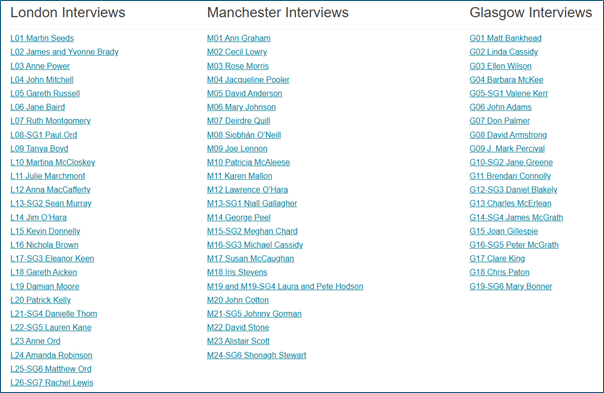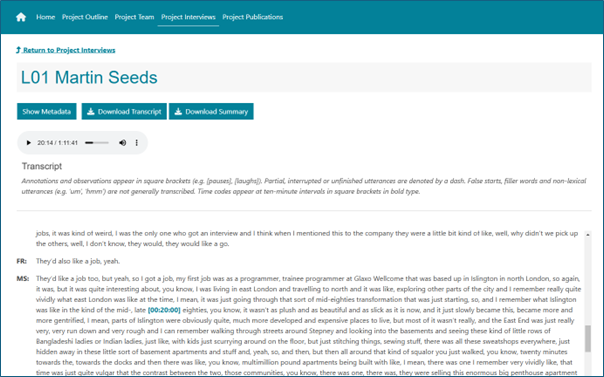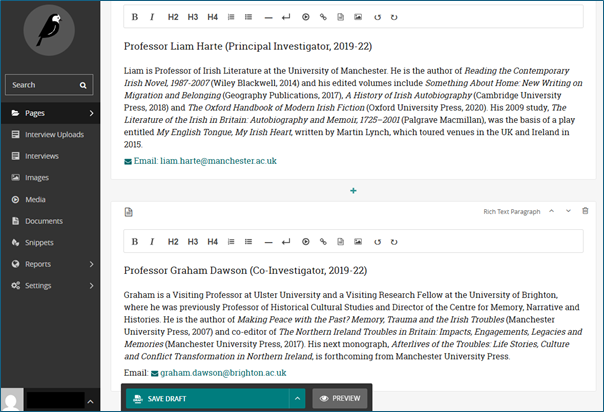The research team that carried out the AHRC-funded study Conflict, Memory and Migration: Northern Irish Migrants and the Troubles in Great Britain, led by Professor Liam Harte in the School of Arts, Languages and Cultures, has recently launched their new project website created by Research IT.
Conflict, Memory and Migration was a three-year interdisciplinary project that brought together researchers from the Universities of Manchester, Brighton and Liverpool to investigate the interlinked histories of the political conflict in Northern Ireland and emigration from the province to Great Britain since the 1960s.
Adopting an oral history approach to this understudied aspect of Irish and British social history, team members conducted in-depth interviews with over seventy individuals of Northern Irish birth or heritage who settled in three locations – London, Manchester and Glasgow – before, during and after the Troubles. The interviews explored a broad range of subjects and elicited a host of compelling insights, memories and experiences from people from diverse regional, religious and class backgrounds, expressed in their own words.
In order to make these insightful recollections available to as wide an audience as possible, a website was created by Research Software Engineers (RSEs) from Research IT, providing open access to this unique and expansive oral history archive (Figure 1). Visitors to the website can listen to interview recordings while reading a written transcript, and download the transcript and summary of each interview. They can also discover more about the project background and access the research team’s peer-reviewed publications to date.

Website Development and Technology
The website was designed and developed by several Research Software Engineers - Theresa Teng, Louise Lever, Catherine McGuire, Awais Khan, Benito Matischen and Joshua Woodcock. The team worked in close collaboration with Professor Harte from grant preparation through the entire software development process. This ensured that the technical specifics for the website were accurately defined (and costed for) in the grant proposal of which the websites formed an important part.
Built using Django (a Python based web framework) the site features a bespoke audio player. This was designed specifically to present the oral history recordings enabling users to easily listen to an interview and look at the timestamped script. (Figure 2).

The use of Wagtail CMS (a content management system built on Django) enables the researchers to manage their own content. The updating and adding of content to the archive is via a simple to use website administration area, without requiring any coding knowledge or input from the RSEs (Figure 3).

I am delighted that we are launching our new project website, which hosts a particularly rich and wide-ranging archive of oral history interviews that documents the distinctive migration histories of Northern Irish people in contemporary Britain. I’m very grateful to the research software engineers for doing such excellent work on the website over many months. We hope the website and archive will attract international attention and deepen public knowledge and understanding of this often overlooked community and the wider social, cultural and political impacts of the Troubles in British society.
This site is an example of many sites developed and supported by the Research IT’s WaDS Service (Wagtail and Django Stack), a full-stack and complete lifecycle option for research focused websites with bespoke requirements building upon a centrally hosted framework and content management system with custom components. If you’d like to discuss possible future collaborations including the development of a bespoke web application, please get in touch with Research IT.

